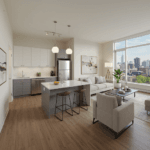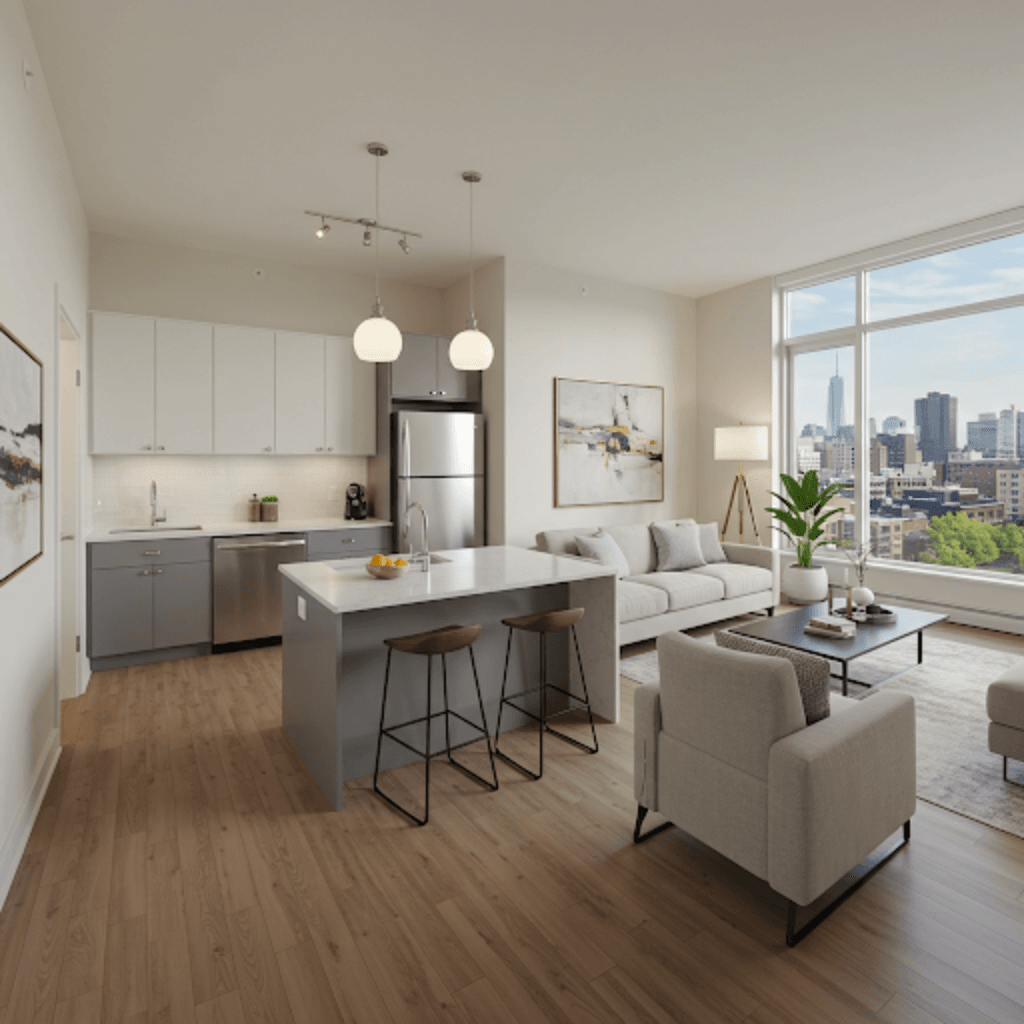
Navigating the US apartment market: A comprehensive guide to buying your dream apartment
Buying an apartment in the United States can be an exciting yet complex process. Whether you’re a first-time buyer or a seasoned investor, understanding the nuances of the market, the legal requirements, and the financial implications is crucial. This guide provides a comprehensive overview of buying an apartment, offering insights and tips to help you navigate the journey successfully.
Understanding the different types of apartments
Before diving into the buying process, it’s important to understand the various types of apartments available. The terminology can sometimes be confusing, so here’s a breakdown:
- Condominiums (Condos): When you buy a condo, you own the individual unit and a share of the common areas (like hallways, elevators, and amenities). You’ll pay monthly homeowner association (HOA) fees to cover the maintenance and upkeep of these shared spaces.
- Cooperatives (Co-ops): Co-ops are a bit different. Instead of owning the unit outright, you purchase shares in a corporation that owns the entire building. These shares entitle you to occupy a specific unit. Co-ops often have stricter approval processes for buyers.
- Townhouses: Townhouses are multi-story homes that share one or two walls with neighboring units. Ownership typically includes the interior and exterior of the unit, and sometimes a small yard. HOA fees may apply.
- Studio Apartments: These are single-room units that combine the living area, bedroom, and kitchen into one space. They are typically smaller and more affordable than other apartment types.
- Loft Apartments: Lofts are characterized by their open floor plans, high ceilings, and large windows. They often have an industrial aesthetic, having been converted from former factories or warehouses.

The apartment buying process: A step-by-step guide
The process of buying an apartment can vary slightly depending on location and specific circumstances, but generally follows these steps:
- Assess your finances: Before you start looking at apartments, get a clear picture of your financial situation. Determine your budget, including how much you can afford for a down payment, closing costs, and monthly mortgage payments (if applicable). Get pre-approved for a mortgage to strengthen your position as a buyer.
- Find a real estate agent: Working with a buyer’s agent is highly recommended. They have expertise in the local market, can help you find suitable properties, negotiate offers, and guide you through the paperwork.
- Start your apartment search: Utilize online listing platforms and work with your agent to identify apartments that meet your criteria (location, size, price, amenities).
- Visit properties: Schedule viewings of apartments you’re interested in. Pay close attention to the condition of the unit, the building, and the surrounding neighborhood.
- Make an offer: Once you’ve found an apartment you love, work with your agent to submit a formal offer. This will include the purchase price, contingencies (such as financing and inspection), and a proposed closing date.
- Negotiate the offer: The seller may accept, reject, or counter your offer. Your agent will help you negotiate to reach an agreement.
- Secure financing: If you’re getting a mortgage, finalize your loan application and work with your lender to secure financing.
- Conduct inspections: It’s crucial to have a professional home inspection to identify any potential issues with the apartment. You may also want to consider specialized inspections (e.g., for pests or mold).
- Review and approve disclosures: The seller is required to provide disclosures about the property’s condition and any known issues. Review these carefully.
- Appraisal: If you’re getting a mortgage, the lender will require an appraisal to ensure the property’s value aligns with the loan amount.
- Final walkthrough: Before closing, conduct a final walkthrough to ensure the apartment is in the agreed-upon condition.
- Closing: Attend the closing, where you’ll sign all the necessary documents and officially become the owner of the apartment.
Financing your apartment purchase
Most apartment buyers require financing. Here are some common options:
- Mortgages: These are loans specifically designed for purchasing real estate. There are various types of mortgages, including fixed-rate and adjustable-rate mortgages.
- Co-op loans: These are specialized loans for purchasing shares in a cooperative. They often have different terms and requirements than traditional mortgages.
- Cash purchase: Some buyers choose to pay for the apartment entirely in cash, eliminating the need for financing.
It’s essential to compare rates and terms from different lenders to find the best financing option for your needs.
Understanding closing costs
Closing costs are fees associated with the purchase of a property, beyond the down payment. These can include:
- Loan origination fees: Charged by the lender for processing the loan.
- Appraisal fee: Pays for the professional appraisal of the property.
- Title insurance: Protects you and the lender from any issues with the property’s title.
- Recording fees: Paid to the local government to record the deed and mortgage.
- Attorney fees: If you hire an attorney to review the legal documents.
- Transfer taxes: Taxes imposed by state or local governments on the transfer of property ownership.
- Homeowner association (HOA) fees (if applicable): You may need to pay prorated HOA fees at closing.
- Mansion tax(for some states): This is charged if the apartment prices exceeds one million.
Closing costs can vary significantly, so it’s essential to get an estimate from your lender early in the process.
Legal considerations
Buying an apartment involves several legal aspects. It’s highly recommended to work with a real estate attorney to ensure your interests are protected. They can:
- Review the purchase agreement: Ensure the contract is fair and protects your rights.
- Conduct a title search: Verify that the seller has clear title to the property.
- Review co-op documents (if applicable): Understand the rules and regulations of the cooperative.
- Represent you at closing: Ensure all documents are properly executed.
Hidden costs of apartment ownership
Beyond the purchase price and closing costs, there are ongoing expenses to consider:
- Property taxes: Paid to the local government, typically annually or semi-annually.
- Homeowner’s insurance: Protects your apartment and belongings from damage or loss.
- HOA fees (if applicable): Cover the maintenance and upkeep of common areas.
- Utilities: Electricity, gas, water, and other utilities.
- Maintenance and repairs: Budget for unexpected repairs and regular maintenance.
Tips for first-time apartment buyers
- Don’t rush the process: Take your time to find the right apartment and make informed decisions.
- Get pre-approved for a mortgage: This shows sellers you’re a serious buyer.
- Work with a reputable real estate agent: Their expertise can be invaluable.
- Read all documents carefully: Understand your rights and obligations.
- Don’t be afraid to negotiate: The purchase price and other terms are often negotiable.
- Inspect a lot: Inspect everything during your visit.
- Consider the future: Think about your long-term needs and whether the apartment will still be suitable in a few years.
The benefits of owning an apartment
While owning an apartment requires careful consideration, it also have it own adventeges:
- Building equity: As you pay down your mortgage, you build equity in the property.
- Potential appreciation: Real estate values can increase over time, providing a return on your investment.
- Stability and security: Owning a home provides a sense of stability and security.
- Customization: You can often make renovations and personalize your apartment to your liking (subject to HOA rules, if applicable).
- Community: Apartment living can foster a sense of community with neighbors.
Buying an apartment is a significant decision, but with careful planning, research, and the right guidance, you can find the perfect place to call home.






